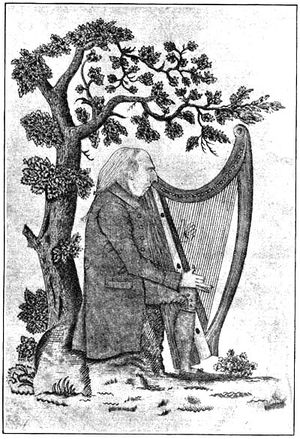Annotation:John Drury (2)
X:1 T:John Drudy T:John Drury [2] M:3/4 L:1/8 B:John & William Neal's c. 1726 issuing of the compositions of Carolan (Dublin) N:There is no key signature in the Neal's printing. K:Gdor d2G2G2|AGAc d2|c2F2A2|c2F2A2|d2G2G2| AGAc d2|f2 de f2|Tc4 A2||G2g2g2|g2 agfe| f2 gfed|{d}c2A2F2|G2g2g2|g2 agfe|{g}f2d2e2| {e}f4e2|d2Bc d2|c2 AB c2|f2 de f2|{d}c2A2F2| dcAc d2|{d}c2A2F2|{d}c2A2c2|{e}f4A2||
JOHN DRURY [2]. AKA - "Welcome to Kingsland," "Planxty Kingsland." AKA and see: "Kathleen Asthore," "Caitlín a stór." Irish, Planxty (3/4 time). G Dorian (O'Sullivan): E Minor (S. Johnson). Standard tuning (fiddle). One part (S. Johnson): AB (O'Sullivan). Composed by blind Irish harper Turlough O'Carolan (1670-1738). Edward Bunting's (1773-1843) title for the tune was "Faulte goh Kingsland or Plangsty Kingsland." O'Sullivan (1958) finds the tune in the Forde manuscripts "John Drury" three separate times; as "Sorry to Part" (from Patrick Carey), "Caitín a Stór" (O'Farrell) and "Caitín mo Stór" (Deasy"). See note for "John Drury (1)" for O'Sullivan's notes on the subject of the title.
Irish researcher Conor Ward found a version of the planxty with a unique third strain in the c. 1885 Francis Reynolds music manuscript collection, of Gaigue, Ballinamuck, County Longord, where it appears under the title "Planxty Kinston" (likely a corruption, remarks Ward, of the placename 'Kingsland' in Bunting's title "Fáilte Romhad go Kingsland". "Planxty Kingsland" was recorded by the Belfast Northern Star of July 15, 1792, as having been played in competition by one of ten Irish harp masters at the last great convocation of ancient Irish harpers, the Belfast Harp Festival, held that week. Ward notes: "The tune also appears in the Leonard-Kernan MS (c. 1845) of Abbeyshrule, Co. Longford as "Planxty Drury" and in the Stephen Grier MS (c. 1883) of Gortletteragh, Co. Leitrim, with the same title and key of A Dorian (Kernan has incorrectly indicated A major)...Reynolds copied a lot of his tunes from another manuscript written by a relation of his--the Patrick O'Farrell MS (c. 1860s) [Aughadowry, Ballinamuck, Co. Longford]. While 'Planxty Kinston' is not in the O'Farrell MS there are pages missing from that manuscript one of which probably contains 'Planxty Kinston' from which Reynolds copied."


